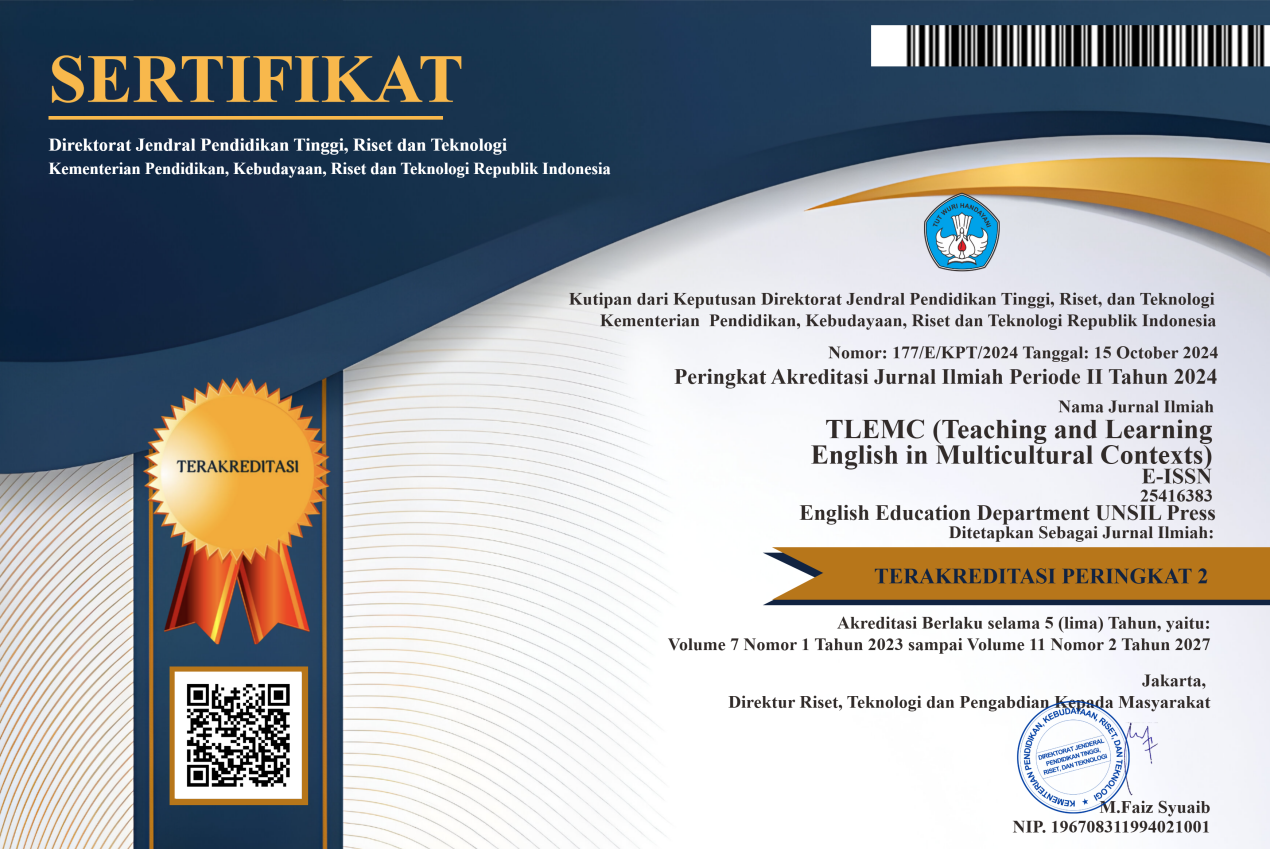KARDS Model: An Alternative Approach to Language Education
Abstract
Students can be motivated by making them aware of their intrinsic and extrinsic motivation. Guiding the student could include addressing the subject’s goals, the nature of the activities, and the techniques used to complete the tasks, including supporting them in determining the best ways to learn. Providing learning facilities indicates that the instructor should be able to facilitate and simplify learning. This is essentially characterized as creating and establishing suitable learning settings and providing learning resources. This piece of paper will emphasise a literature review on the KARDS Model as an alternative conceptualization for language training. The review is based on journal papers, conference proceedings, and book chapters that explore Kumaravadivelu's KARDS Model. The scope of this discussion is limited to the following points: (1) presenting Postmodernism as a relevant theoretical framework in the context of language teacher education and (2) presenting the KARDS model as an alternative conceptual outline that can help language teachers address teaching issues more effectively. This finding demonstrates that teachers must keep their knowledge, which serves as their academic medium of communication, up to date in order to survive in academic contexts. Their enhanced professional and personal knowledge is projected to lead to more positive perceptions. This distinction may be justified by the circulation of knowledge transfer and building, the routine exchange of knowledge, and academicians' access to the most recent results.
Keywords: Alternative Approach, KARDS Model, and Language Education
Full Text:
PDFReferences
Akbari, R. (2007). Reflections on reflection: A critical appraisal of reflective practices in L2 teacher education. System, 35(2), 192-207.
Akbari, R. (2008). Postmethod Discourse and Practice. TESOL Quarterly, 42(4), 641-652.
Arıkan, A. (2006). Postmethod condition and its implications for English language teacher education. Journal of Language and Linguistic Studies, 2(1), 1-11.
Freeman, D. (1989). Teacher training, development, and decision making: A model of teaching and related strategies for language teacher education. TESOL Quarterly, 23(1), 27-46.
Freeman, D. (2001). Second language teacher education. In R. Carter & D. Nunan (Eds.), The Cambridge guide to teaching English to speakers of other languages (pp. 72-80). Cambridge: CUP.
Hassani, V., Khatib, M., Yazdani Moghaddam, M. (2019). An Investigation of Teachers' Perceptions of KARDS in an EFL Context. International Journal of Foreign Language Teaching and Research, 7(28), 135-153.
Hassani, V., Khatib, M., Yazdani Moghaddam, M. (2019). Contributions of KARDS to Iranian EFL University Teachers' Professional Identity. Journal of English Language Teaching and Learning, 11(23), 127-156.
Hassani, Vahid. (2021). Design, Construction, and Validation of KARDS Questionnaire for the Context of Iran Ph.D., in Applied Linguistics, Department of English, Faculty of Literature and Humanities, Science and Research Branch, Islamic Azad University, Tehran.
Hassani, Vahid & Khatib, Mohammad. (2019). Kumaravadivelu's Language Teacher Education Modular Model (KARDS) to Professional Identity of High School Teachers in an EFL Context. Ph.D. in TEFL, Department of English, Science and Research Branch, Islamic Azad University, Tehran, Iran.
Johnson, K. E. (2009). Second language teacher education: A sociocultural perspective. New York: Routledge.
King, E. T. (2013). Review of language teacher education for a global society: A modular model for knowing, analyzing, recognizing, doing, and seeing. TESL-EJ, 16(4).
Kumaravadivelu, B. (2001). Toward a Post method Pedagogy. TESOL Quarterly. 35. 4. 537-560.
Kumaravadivelu, B. (2003). Beyond methods: Macrostrategies for language teaching. New Jersey: Yale University Press.
Kumaravadivelu, B. (2006). TESOL Methods: Changing Tracks, Challenging Trends. TESOL Quarterly. 40. 1. 59-81.
Kumaravadivelu, B. (2006). Understanding language teaching: From method to post method. Mahwah, New Jersey: Lawrence Erlbaum Associates.
Kumaravadivelu, B. (2012). Language Teacher Education for a Global Society: A modular model for knowing, analyzing, recognizing, doing, and seeing. New York & London: Routledge.
Pennycook, Alastair. (1989). The Concept of Method, Interested Knowledge, and the Politics of Language Teaching. TESOL Quarterly. 23. 4. 589-618.
Pennycook, A. (1990). Critical pedagogy and second language education. A system, 18(3), 303-314.
Richards, J. C. (2008). Second language teacher education today. RELC Journal, 39(2), 158-177.
Richards, J. C., & Farrell, T. S. C. (2005). Professional development for language teachers. Strategies for teacher learning. New York: Cambridge University Press.
Roberts, J. (1998). Language teacher education. London: Arnold.
Sardabi, N., Biria, R., & Ameri Golestan, A. (2018). Reshaping teacher professional identity through critical pedagogy-informed teacher education. International Journal of Instruction, 11(3), 617-634.
Talebinezhad, M. R., & Shahidi Pour, V. (2015). A critical look at CLIL on the basis of KARDS model. International Journal of Language Learning and Applied Linguistics World, 9(2), 254-271.
DOI: https://doi.org/10.37058/tlemc.v8i1.5232
Refbacks
- There are currently no refbacks.
INDEXED BY:
This work is licensed under a Creative Commons Attribution-NonCommercial-ShareAlike 4.0 International License.
![]()
TLEMC (Teaching and Learning English in Multicultural Contexts)
Program Studi Pendidikan Bahasa Inggris
Fakultas Keguruan dan Ilmu Pendidikan
Universitas Siliwangi
Jl. Siliwangi No. 24 Kota Tasikmalaya - 46115
email: tlemc@unsil.ac.id





